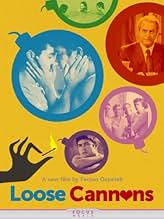Bravo for Ivan Cotroneo, the talented translator of Cunningham and Kureishi, among other evident skills, and for Fernan Ozpetek, the only Italian director (though he happens to be Turkish by birth) who regularly and reliably features positive gay characters in his films. In an Italy that, at least as issues of sexual identity and respect for difference are concerned, has just barely crossing the threshold of the 1980s, Ozpetek is a rarity and a treasure. The first two-thirds of Mine Vaganti (Loose Cannons) will seem dated to anyone familiar with the last 30 years of queer representation in American cinema, as will the melodramatic, end-of-the-world reaction of Tommaso's father to learning that his son is gay, but the last third hits all the right dramatic and emotional notes and redeems any doubts one might have about the rest. There are some outstanding performances here: Ilaria Occhini as Tommaso's grandmother, and the gorgeous Nicole Grimaudo as the disconsolate and complex Alba. In fairness, I even have to throttle back some of my knee-jerk dislike for Scamarcio. It's not that he's a standout here, but playing a gay character is still a brave move in Italian cinema, especially for an actor who still depends on teen-heartthrob roles for his bread-and-butter. He's certainly no more or less believable as a gay man than are any of the other actors in the film, though even that's a throwback to the days when U.S. cinema divided representations of gay men between "normal," masculine gays (Tommaso—who may be gay, but still knows how to play soccer—his boyfriend, and his brother) and the "sassy gay friends" who are frivolous and effeminate and whose only purpose is to provide comic relief. Still, Mine Vaganti is a giant step forward and a welcome and charming antidote to government silence and Vatican-inspired hate speech.
































